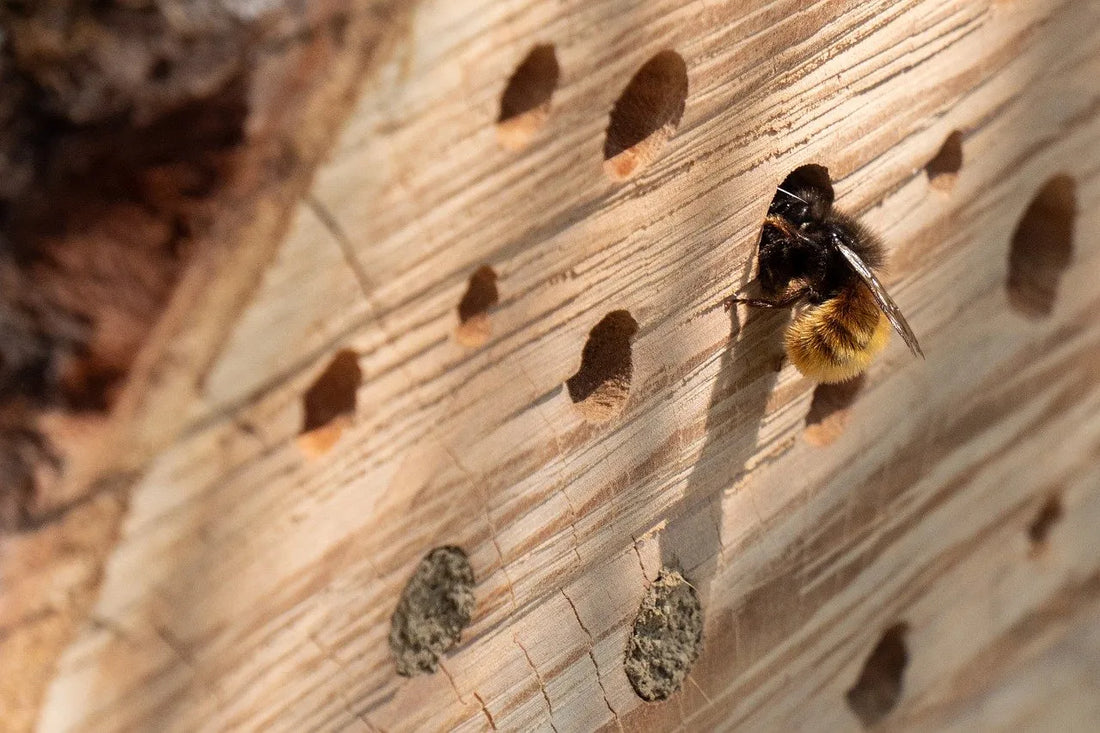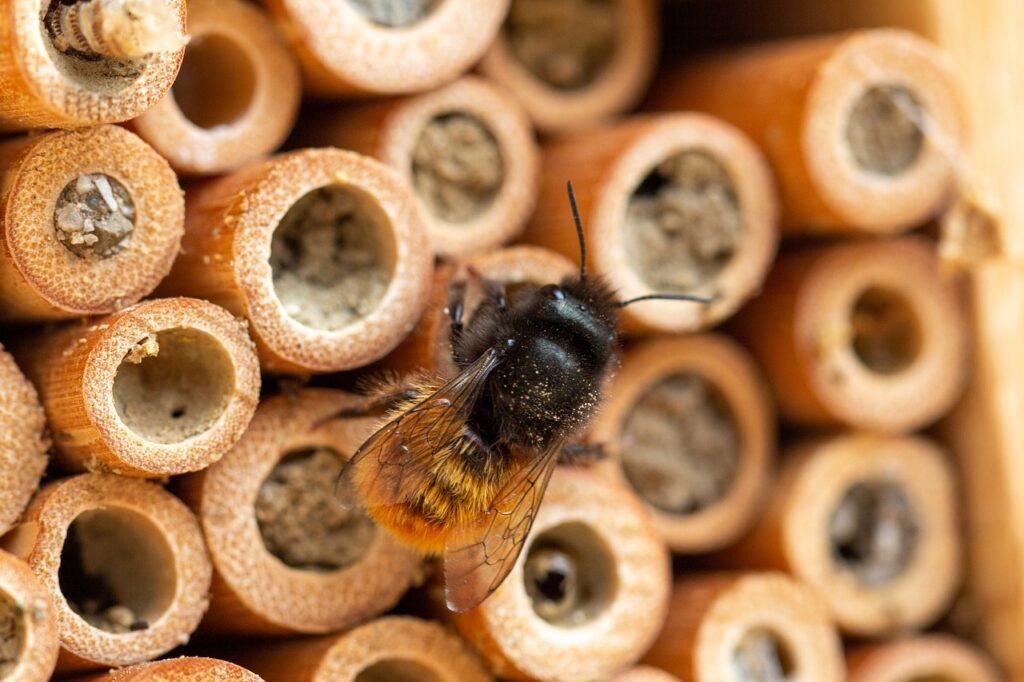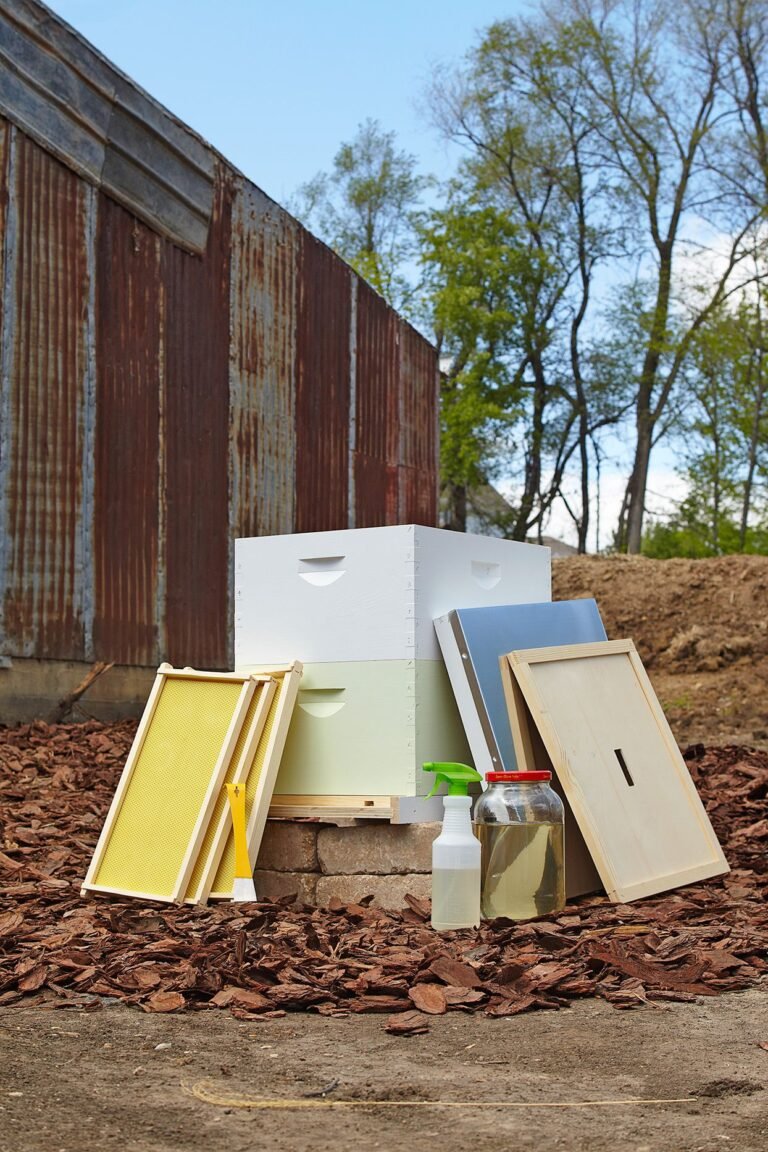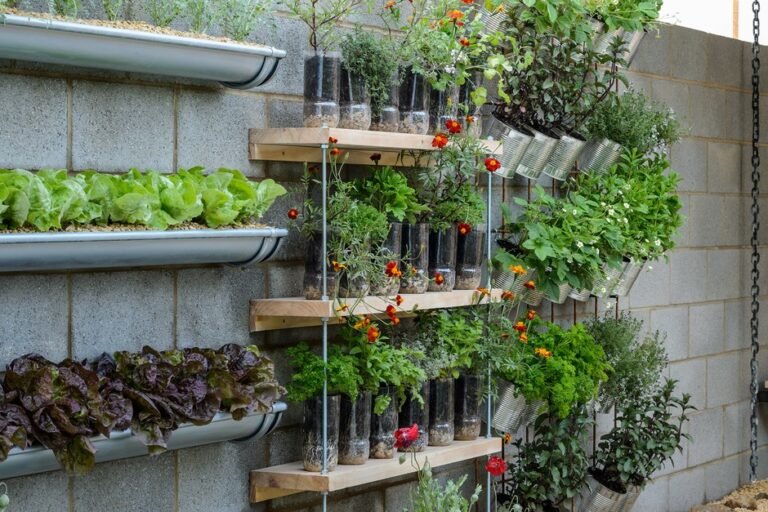Bee hotels play a crucial role in the survival of solitary bees. Unlike honeybees, these independent insects don’t live in hives.
They need safe spaces to thrive and carry out their vital role in our ecosystem. Imagine a world where every flower and crop blooms to its fullest potential, all thanks to the tireless work of these small but mighty pollinators.
This is the world bee hotels can help sustain. Solitary bees are the unsung heroes of the pollination world. They work alone, quietly buzzing from flower to flower, ensuring plants reproduce and crops bear fruit. But with their natural habitats disappearing, these valuable pollinators face a housing crisis. Enter the bee hotel: a simple yet effective solution to provide safe nesting sites for these insects. Bee hotels are not just a cute garden feature; they are lifelines for solitary bees, offering them a place to lay their eggs and secure the future of their species. By understanding the importance of bee hotels, we can take a small step towards a healthier environment. This post will dive into the world of solitary bees and the reasons why setting up a bee hotel in your backyard could be one of the best things you do for nature’s little workers.
The Plight Of Solitary Bees
Imagine a world without the soft buzz of bees working in the spring. Solitary bees face a silent crisis. These unsung heroes are key in pollination. Yet, they struggle to survive in the modern world.
Differences Between Solitary And Social Bees
Unlike honeybees, solitary bees live alone. They don’t form hives. Each female bee lays eggs in her own nest. These bees are peaceful and efficient pollinators.
Threats To Solitary Bee Populations
- Habitat loss: Urban spread eats up nesting sites.
- Pesticides: Chemicals harm bees directly or through plants.
- Climate change: Altered weather patterns disrupt life cycles.
These threats leave bees with fewer places to call home. Bee hotels offer a lifeline. They provide safe nesting sites. This helps solitary bees thrive again.
Importance Of Pollination
Pollination is vital to the survival of ecosystems. It allows plants to reproduce, creating fruits and seeds. These fruits and seeds serve as food for a multitude of animals, ensuring biodiversity. Without pollination, many plants would fail to reproduce, disrupting food chains.
Role Of Bees In Ecosystems
Bees play a critical role in pollinating flowering plants. They transfer pollen as they move from flower to flower. This process supports the growth of trees, flowers, and other plants, which provide habitat and food for wildlife.
Impact On Human Food Supply
Bees are essential for the production of many crops. Nearly one-third of the food humans eat depends on pollination by bees. This includes fruits, vegetables, and nuts, vital for a balanced diet.
Introducing Bee Hotels
Bee hotels are a big help for solitary bees. These bees live alone, not in hives like honeybees. They need safe places to lay eggs. Bee hotels offer just that. Let’s dive into why these are so important.
What Are Bee Hotels?
Bee hotels are man-made structures. They provide solitary bees with a place to nest. These bees are vital for pollinating plants. Unlike honeybees, they do not produce honey. But they play a key role in nature. Bee hotels can be simple or complex. They help these bees thrive.
Design And Functionality
The design of a bee hotel matters. It should have small holes or tubes. These are where bees lay their eggs. The materials can vary:
- Wood – Often used for the structure.
- Bamboo – Great for tubes.
- Clay – Sometimes used for the outer shell.
The goal is to mimic natural nesting sites. This helps the bees feel at home. A good bee hotel also has:
- A roof to protect from rain.
- Varying tube sizes for different bee species.
- Enough depth for bee larvae to grow safely.
Placing bee hotels in your garden supports these vital pollinators. It helps the environment. It also brings more bees to your flowers. A win-win for everyone.

Benefits Of Bee Hotels
Bee hotels offer vital support to solitary bees. These bees don’t live in hives like honeybees. Instead, they nest alone. Bee hotels provide safe nesting sites. This helps maintain bee populations. It also boosts local garden health. Let’s explore the benefits of these eco-friendly structures.
Supporting Bee Habitat
Solitary bees face habitat loss. This is due to urban development and intensive farming. Bee hotels mimic natural nesting sites. They fill the gap left by habitat loss. This encourages bee reproduction and survival. As solitary bees have a safe place to live, they continue to thrive. This is crucial for their future.
Enhancing Pollination In Gardens
Solitary bees are excellent pollinators. They work more efficiently than honeybees. By using bee hotels, gardens see better pollination. This leads to more flowers and higher crop yields. Home gardeners witness a visible difference. They enjoy more vibrant gardens. This is a simple way to support our ecosystem.
Placement And Maintenance
Understanding placement and maintenance of bee hotels is crucial. These practices ensure solitary bees thrive. Good positioning attracts more bees. Regular upkeep prevents disease. Together, they create a safe haven for these vital pollinators.
Choosing The Right Location
Location choice for a bee hotel affects its success. It should face the morning sun. This warms the bees early. It should be away from harsh weather. A location with no strong winds is best. The hotel should be off the ground. This protects against dampness and predators.
- South or east-facing to catch morning sunlight
- Sheltered from rain and strong winds
- Elevated at least a meter from the ground
- Near flower-rich areas for easy food access
Caring For Bee Hotels
Maintenance is key for a safe bee habitat. Check the hotel regularly. Look for signs of wear or damage. Replace hollow tubes once occupied. This stops disease spread. Cleaning is best done in late autumn. This is when bees are least active. Always use gentle methods. Harsh chemicals harm bees.
| Task | Frequency | Tips |
|---|---|---|
| Inspection | Monthly | Check for damage or blockages |
| Tube Replacement | Yearly | Post-bee emergence |
| Cleaning | Annually | Use mild, natural cleaners |
Community And Educational Value
The ‘Community and Educational Value’ of bee hotels goes beyond just helping bees. It brings people together and teaches them about nature. Bee hotels are not just homes for solitary bees. They are tools for learning and community building.
Raising Awareness
Bee hotels help raise awareness about the importance of bees. Many people think all bees live in hives. This is not true. Solitary bees do not have hives. They need bee hotels. By setting up a bee hotel, you show people how diverse bees are.
- Bee hotels show the need for bee habitats.
- They help people learn about different bee species.
Involving Schools And Local Groups
Working with schools and local groups spreads the word about bees. It is a fun, hands-on way to learn. Children and adults alike enjoy building and monitoring bee hotels. This activity teaches them about bees and their role in our ecosystem.
- Start a project to build bee hotels with local schools.
- Hold workshops to teach about bee conservation.
- Create a community garden with bee hotels.
Challenges And Considerations
Challenges and Considerations are crucial when creating a bee hotel. Understanding these can help ensure the success and safety of solitary bees.
Potential Drawbacks
Bee hotels aren’t always perfect. They can face issues.
- Pests and parasites may invade.
- Hotels can become breeding grounds for disease.
- Overcrowding can occur if not monitored.
- Maintenance is key to prevent these problems.
Encouraging Native Species
It’s best to focus on local bee species. Here’s why:
- Native bees are adapted to local environments.
- They pollinate local plants more effectively.
- Using native materials can attract them.
- Research local species to tailor your bee hotel.

Making A Difference
Our buzzing friends, the solitary bees, need our help. Solitary bees are vital for pollination. Unlike honeybees, they live alone and don’t produce honey. But they are excellent pollinators. Many species are declining due to habitat loss. We can make a real impact. Building a bee hotel supports these helpful insects. Let’s learn how to create a safe haven for them.
How To Build Your Own Bee Hotel
Creating a bee hotel is simple and fun. You need just a few materials:
- Bamboo canes or hollow stems
- Untreated wood for the frame
- Drill with various-sized bits
Follow these steps:
- Cut the bamboo to fit your frame.
- Drill holes of different sizes in the wood.
- Arrange the canes and wood blocks snugly.
- Mount your hotel facing the morning sun.
Make sure your hotel is dry and secure. A busy bee hotel will buzz with activity!
Contributing To Conservation Efforts
By building a bee hotel, you join conservation efforts. Your hotel offers a nesting site. This helps maintain bee populations. It also encourages biodiversity. As bees pollinate, they support local plant life. This has a positive ripple effect on the ecosystem. Your action, small as it may seem, contributes to a bigger cause. It supports life and growth in your garden and beyond.
Remember, every bee hotel counts. Start building today!

Frequently Asked Questions
What Are Bee Hotels?
Bee hotels are structures designed to provide solitary bees with nesting sites. Unlike honeybees, solitary bees do not live in hives but still need safe places to lay their eggs. Bee hotels help by offering various sized holes where bees can nest and reproduce safely.
Why Are Solitary Bees Important?
Solitary bees play a crucial role in pollinating plants, including fruits, vegetables, and flowers. They are more efficient pollinators than honeybees because they practice “buzz pollination,” which helps release pollen more effectively. Their work supports biodiversity and healthy ecosystems.
How Do Bee Hotels Help The Environment?
By supporting solitary bee populations, bee hotels contribute to the pollination of plants, which is essential for food production and maintaining healthy ecosystems. They help increase biodiversity and can also raise awareness about the importance of pollinators and the challenges they face.
Can I Make My Own Bee Hotel?
Yes, making a bee hotel can be a simple DIY project. You can use materials like bamboo, hollow stems, or drilled blocks of wood. The key is to ensure various hole sizes to accommodate different bee species and to place the hotel in a sunny, protected spot.
Conclusion
Bee hotels offer a safe haven for solitary bees, our unsung pollination heroes. These structures are vital for their survival and, in turn, our ecosystems. They provide nesting space, crucial during declining natural habitats. Your garden can become a sanctuary with a simple bee hotel.
Embrace bee hotels and give these incredible insects a boost. They need our help, and it’s easy to lend a hand. Let’s support our buzzing friends for a healthier, more vibrant world.



